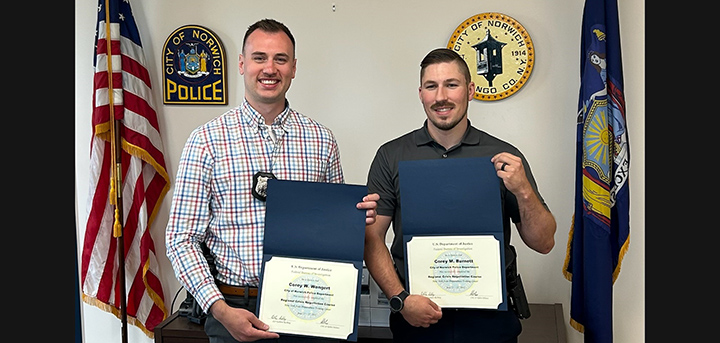Convicted Drug Dealer: The Problem Is The Demand, Not The Supply
Published:
January 27th, 2014
By:
Ashley Babbitt

I feel as though I should begin this with some sort of disclaimer, but I’m not entirely sure if it would make a difference. What follows is derived from a discussion I had with a man currently incarcerated at the Chenango County Correctional Facility. He’ll soon be transferred from the jail to state prison to begin his five-year sentence.
Perhaps some of you have read about him on the front page of The Evening Sun. What I want to share wasn’t really said in court. After witnessing him in court impressively represent himself, I felt compelled to ask permission for an interview. I am grateful he agreed to meet with me.
His name is Barry Rattley. He’s 29. He loves to read, play basketball, his favorite color is blue, and he likes his steak well-done.
I bet most of the residents of the county don’t know that. I doubt they’d care to know that. To most, I am sure he is “just another out-of-towner ruining our fine community.”
Personally, I’d rather lump him in the category of “human.”
Note: For the rest of this piece, I will refer to him by his first name, since this is an opinion piece, and I’d rather treat him as the human I met with, not as a defendant in a courtroom.
He was arrested twice in Chenango County and was found to be in possession of substances prohibited by legislation. Heroin and cocaine.
“Yes, I am guilty,” he told me. “I am accepting my time. What I did was illegal.”
Barry politely asked that I make it clear to the community that he is not seeking for anyone to feel bad for him. He knows he broke the law, and is going to serve the time sentenced by the court.
He did have insight to offer from a perspective that I feel many residents don’t get to hear. Perspective from the dealer.
“I hear a lot lately about the heroin epidemic in the area,” he said. “I read it in the paper. I saw it at court. People come in and out of here that are addicts. There needs to be some changes in the system, though.”
Barry does not use heroin or cocaine. He told me he only sold the product to consenting adults who wanted to buy it. Never did he force drugs on anyone; never did he sell drugs to a child, and never did he take part in such a transaction with a pregnant woman.
Yes, I understand that once the product leaves his hands, it is impossible to tell if someone from there sells it to a child or pregnant woman, but it was nice to hear that from him.
Were people negatively affected because of his choice of business decisions? Sure. Did he force a needle into someone’s arm? No. Did he make John Doe break into your neighbor’s car to get money for drugs? No. They made those decisions. They made those decisions because they wanted to get high.
He explained that throughout his time in the jail, he has seen many addicted individuals come in and out. “While they’re in here, they are drug free. They appear in court and as an alternative to incarceration, they are offered court mandated drug treatment. That isn’t working.”
“There are some people who go to meetings like Narcotics Anonymous because they really are wanting to be clean. They are sharing the intimate details of their life and their addiction. Others are just going because they have to,” he said. “I think there needs to be other options – long-term, inpatient programs like Phoenix House or Fortune Society – places where addicts can truly get the help they need.”
Barry said that keeping them in the county jail for a little while and then letting them out, and requiring them to report to probation and provide urine samples isn’t enough.
“If the people of the county want the drugs gone, you have to get rid of the demand,” he said, noting that even though he has been in jail for 15 months, it does not reduce the supply. Other dealers are here providing the customers with drugs whether or not he is in prison.
“I can see why the community is extremely pissed,” Barry told me. “16-year-old kids are shooting H into their veins. Education is important; and for the people that really need help, you have to offer them viable programs.”
“Lots of times, it’s when the people that invite the dealers from out of town get caught, they get a ‘get out of jail free card’ for turning in the person they brought. That doesn’t help the person addicted because they are back out on the streets getting high, bringing other dealers in.”
I asked Barry why he chose to represent himself in court. As a man who has served time before for similar non-violent offenses, he said he couldn’t put his life in someone else’s hands again.
“This time, the only person I can blame is myself,” he said.
Now, I was never assigned to the “court beat” as a reporter, but I covered it here and there. The first time I went to court as an employee here was for the Ramsaran arraignment. Former staff writer Kevin Doonan went back to the office directly following Ramsaran’s appearance and wrote me a note before exiting the courtroom that said, “You can handle the rest of these. I’m going to write this up. Write everything down.” I did. Barry was next on the schedule. I was immediately impressed.
As editor, I receive both complaints and praises about the community. I enjoy taking a couple hours out of my day a couple times a week to go to court to check out some of the things for myself that people are upset about. At the same time, I also check out the ‘happy stuff.’
At any rate, I have tried to make it to each of Barry’s appearances. He filed motions that I knew were impressive. During questioning of witnesses with regard to a motion to suppress that he filed, he referred to himself in the third person.
It turns out he spent as much time as he could in the law library studying the process and learning everything he could.
“I knew I was the one in charge of how things were going to go. I read up on case law and knew I had to come up with the best questions possible,” he said.
In the end, he opted to change his plea to guilty prior to trial. He said that he weighed his options and if he had taken it to trial, his chances of acquittal appearing pro se were not good. He figured he would have been sentenced to more than a decade of state time.
Barry and I spent a little while chatting about the light sentences for sex offenders in the area, compared to sentences for drug offenses.
Barry was sentenced to five years. I know I said that before, but let that sink in. I know, I get it, he broke the law. He gets it, he broke the law. I am fully aware of the saying, “You do the crime, you do the time.” But this man, this human who did not directly hurt anyone, is going to a maximum security facility.
Now this is only my opinion, and I’m sure I’m in the minority, but he did not force or coerce anyone to do anything.
If there were more viable options for addicts in the area, there would be fewer addicts. If there were fewer addicts, there would not be the demand for “out-of-towners to come poison our junkies.” If there were better treatment options for addiction in the area – even an inpatient facility within the city – I’m willing to bet the petit larceny offenses would go down.
Will people stop breaking into homes and cars in the county because Barry is in state prison? No. Will people stop shooting heroin into their arms, or between their toes because Barry is in prison? No. Is it sending a message to others to stop coming here to sell drugs? No, because there is a demand and unfortunately, there are so many people addicted. Is Barry responsible for the addiction of another human being? No. He is responsible for himself.
And he is taking responsibility for the choices he opted to make.
What would he rather be doing? Well, he wanted to be a marine biologist. He loves the aquarium on Coney Island. I think he’ll make a fine marine biologist one day. Or lawyer.
Barry is heading to state prison soon, and told me he is never returning to Chenango County.
Did you all catch that part? The out-of-towner poisoning your community is gone, and won’t be back.
You know what’s not gone? Heroin. Addiction. And the heartbreak caused by the two. Your 30-year-old son is still shooting heroin in his veins. The teenage girl and her friends down the street may break into your garage next week so they can buy a bundle from the Norwich native who is selling out of his apartment around the corner.
Agree with me or not, but I’m with Barry on this one. The method in place isn’t working. It won’t work. Long-term, inpatient treatment, education, and a little compassion just might.
Author: Ashley Babbitt - More From This Author
Comments








